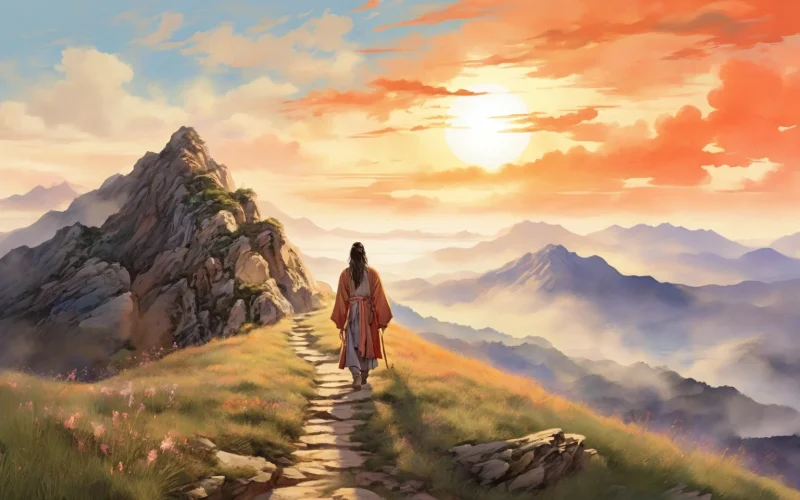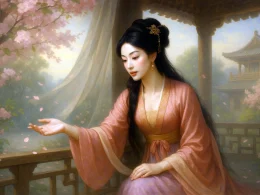From the east the sun comes around;
It seems to rise from underground.
Crossing the sky, it sinks in the sea of the west.
Where could the six dragons driving it take their rest?
It never changes from beginning to end.
Man is not a spirit,
Could he accompany it
As a dear friend?
Grass will not for its growth thank the spring breeze;
Leaves won't complain of autumn when fallen from trees.
Who could drive summer and winter, autumn and spring?
Nature rules over rise and fall of everything.
O Driver of the Sun,
What on the boundless waves have you done?
O Herculean Son,
How could you wield your spear to stop the Driver's run?
You go against the law divine.
What you do is quite out of line.
I would embrace the universe
To be one with Nature for better or for worse.
Original Poem
「日出入行」
李白
日出东方隈,似从地底来。
历天又入海,六龙所舍安在哉?
其始与终古不息,人非元气,安得与之久徘徊?
草不谢荣于春风,木不怨落于秋天。
谁挥鞭策驱四运?万物兴歇皆自然。
羲和!羲和!汝奚汩没于荒淫之波?
鲁阳何德,驻景挥戈?
逆道违天,矫诬实多。
吾将囊括大块,浩然与溟涬同科!
Interpretation
"Song of Sunrise and Sunset" is Li Bai's reflection and response to ancient myths and legends. In this poem, he presents a unique perspective on the rising and setting of the sun and the laws of nature. Li Bai critiques the traditional belief that natural phenomena are controlled by deities, emphasizing that the rise and fall of all things are natural outcomes. Through his questioning of ancient myths, the poet reveals his profound understanding of nature and his inclination toward materialist thought.
First Couplet: “日出东方隈,似从地底来。历天又入海,六龙所舍安在哉?”
Rì chū dōng fāng wēi, sì cóng dì dǐ lái. Lì tiān yòu rù hǎi, liù lóng suǒ shě ān zài zāi?
The sun rises from the eastern horizon, as if emerging from beneath the earth. It traverses the sky and then sinks into the sea—where do the six dragons rest?
These lines vividly describe the natural cycle of the sun's rise and fall. Li Bai questions the ancient myths of six dragons pulling the sun and Xihe driving it, suggesting that the sun's movement is not driven by divine power but is instead a manifestation of natural law.
Second Couplet: “其始与终古不息,人非元气,安得与之久徘徊?”
Qí shǐ yǔ zhōng gǔ bù xī, rén fēi yuán qì, ān dé yǔ zhī jiǔ pái huái?
From beginning to end, the sun never ceases, but humans, lacking the primordial energy, how can we linger with it eternally?
These lines further contrast the eternal nature of the sun with the brevity of human life, questioning how humans can align themselves with such an unchanging natural force.
Third Couplet: “草不谢荣于春风,木不怨落于秋天。谁挥鞭策驱四运?万物兴歇皆自然。”
Cǎo bù xiè róng yú chūn fēng, mù bù yuàn luò yú qiū tiān. Shuí huī biān cè qū sì yùn? Wàn wù xīng xiē jiē zì rán.
Grass does not thank the spring breeze for its flourishing, nor do trees resent autumn for their falling. Who wields the whip to drive the four seasons? The rise and fall of all things follow natural laws.
Through the natural cycle of grass and trees, the poet emphasizes that the life and death of all things are governed by natural laws, free from external intervention, revealing the truth of nature's impermanence.
Fourth Couplet: “羲和!羲和!汝奚汩没于荒淫之波?鲁阳何德,驻景挥戈?”
Xī hé! Xī hé! Rǔ xī gǔ mò yú huāng yín zhī bō? Lǔ yáng hé dé, zhù jǐng huī gē?
Xihe! Xihe! Why do you drown in the waves of excess? What virtue does Lu Yang possess to halt the sun's course and wield his spear?
Here, the poet uses a mocking tone to question the deities and heroes of myth, emphasizing that nature is not governed by divine power but operates according to its own laws.
Fifth Couplet: “逆道违天,矫诬实多。吾将囊括大块,浩然与溟涬同科!”
Nì dào wéi tiān, jiǎo wū shí duō. Wú jiāng náng kuò dà kuài, hào rán yǔ míng xìng tóng kē!
To defy the Dao and violate heaven is futile; falsehoods and deceptions abound. I shall embrace the vast cosmos, merging with the boundless universe!
In the end, Li Bai expresses an ideal of transcending the self and harmonizing with nature, suggesting that only by following the Dao and natural laws can one achieve true freedom and eternity.
Overall Appreciation
This poem is not merely a reflection on natural phenomena but also a proclamation of philosophical insight. Through his questioning of ancient myths, Li Bai expresses his profound understanding of the infinite cyclical laws of nature. His poetic language is filled with passion and power, as he not only challenges traditional mythological beliefs but also emphasizes the idea that humans should conform to nature and merge with the cosmic flow. Through his philosophical verses, Li Bai imbues the poem with depth and expressive power, inviting deep contemplation.
Writing Characteristics
- Using Scenery to Convey Emotion, Blending Scene and Feeling: The poet uses imagery such as "the sun rises from the eastern horizon," "grass does not thank the spring breeze," and "trees do not resent autumn" to illustrate the philosophy of natural cycles, enriching the poem's意境 (artistic conception).
- Contrast to Enhance Philosophical Depth: The poem contrasts "the sun's rise and fall" with "the brevity of human life," and "the flourishing and withering of grass and trees" with "natural laws," adding layers of meaning.
- Layered Progression, Tight Structure: The poem moves from describing natural phenomena to questioning myths and finally proposing the idea of conforming to nature, with clear logic and profound thought.
Insights
This poem offers profound insights into the laws of nature, reminding us to live in harmony with nature and adapt to its changes. Through his poetry, Li Bai conveys a rational idea: all changes in nature follow inherent laws, and humans should not attempt to defy these laws but instead respect and conform to the Dao of nature. This natural philosophy encourages us to reflect on our way of life, urging us to humbly accept the power of the universe and find meaning within it.
Poem translator
Xu Yuan-chong(许渊冲)
About the poet

Li Bai (李白), 701 - 762 A.D., whose ancestral home was in Gansu, was preceded by Li Guang, a general of the Han Dynasty. Tang poetry is one of the brightest constellations in the history of Chinese literature, and one of the brightest stars is Li Bai.












